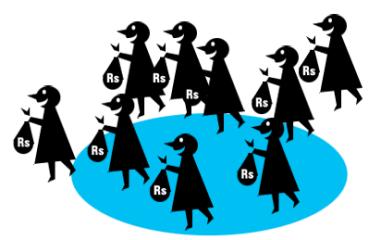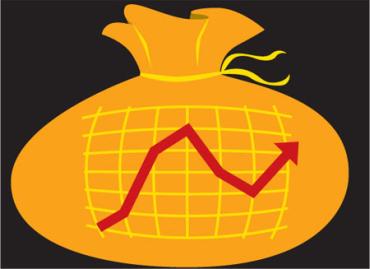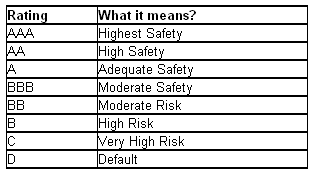 | « Back to article | Print this article |
Investing: Is THIS debt scheme better than FDs?
How investing in non-convertible debentures gives better returns than investing in fixed deposits in these volatile times.
The volatility in stock markets and the high returns offered by debt instruments are making investors rush to safety of fixed income instruments. In such times NCDs or non-convertible debentures are explored as one of the options by investors apart from fixed deposits and FMPs.
NCDs offers high returns with moderate risk while giving you flexibility of choosing between short and long tenures. There is always a demand for good rated investment products which can offer attractive returns. Keeping this in mind, companies keep on coming with debenture issues to raise capital from the market.
In the current scenario, when equity markets are not doing well, NCDs have become more important from investor point of view as they offer attractive returns with the benefit of liquidity. There is also a separate set of investors who prefer to invest in such issues irrespective of equity market movement.
An NCD is a fixed income debt paper issued by a company. In other words, the issuer agrees to pay a fixed interest on your investment. As the name suggests, these debentures cannot be converted into shares of the issuing company like convertible debentures where investors have the option of getting shares in the issuing company on conversion.
An NCD can be either secured or unsecured. For secured debentures, which are backed by assets, in case the issuer is not able to fulfill the obligation, the assets are liquidated to repay the investors holding the debentures. Secured NCDs offer lower interest rates compared to unsecured ones.
If you need a regular income from NCDs, you can pick those that pay interest on monthly, quarterly or yearly basis. If you just want to grow your wealth, you can opt for cumulative option where interest earned is reinvested and paid at maturity.
Any Indian company can raise money through NCDs if it has a tangible net worth of at-least Rs 4 crore and has been sanctioned loans by banks or financial institutions which is classified as 'standard asset' and not a bad debt.
Companies seeking to raise money through NCDs have to get their issue rated by credit rating agencies such as CRISIL, ICRA, CARE and Fitch Ratings.
NCDs with higher ratings are safer as this means the issuer has the ability to service its debt on time and carries lower default risk.
Courtesy: Investment-mantra.in
Investing: Is THIS debt scheme better than FDs?
NCDs vs bank fixed deposits
NCD is better than a bank deposit as the interest differential is quite significant which comes at just a slightly higher risk. The risk return ratio is in favour of NCDs.
Currently bank fixed deposits are offering an interest of 9 per cent to 10 per cent for tenure of one to five years. In contrast, recently NCDs have offered 11.6 per cent for five years and 11.35 per cent for three years to individuals.
A bank fixed deposit or savings offered by postal deposit is for a maximum of five to seven years. In contrast, NCDs are available from two years to as much as twenty years. You can use long tenure NCDs to create retirement corpus.
Investing: Is THIS debt scheme better than FDs?
Risk assessment
An investment offering higher returns invariably comes with additional risks. The biggest risk with NCDs is the possible capital loss in case of increase in interest rates. NCDs pay a fixed coupon or interest rate which is paid to the holder of the instrument at maturity. If you sell an NCD in secondary market where interest rate is higher than that offered by debenture, your return will be less or even negative as the buyer will pay only that amount which allows her/him to get the return equal to prevailing market rate. If the interest rate goes down, your effective return will be higher than that offered on the NCD.
Apart from the risk of lower return or loss of capital, there is the risk of default by the company even though chances are low as most of the firms are under the supervision of RBI or SEBI. As NCDs are secured against assets of issuing company, risk of default is low. In addition, debentures of blue chip companies have less risk as these firms have robust finances. Small companies have more risk and so offer high rate of interest. NCDs can also be traded on bourses, but one might not be able to find a buyer if the trading volume of debenture is low.
Huge debt obligations of a company mean it might have trouble repaying its debt. So one should see the debt equity multiple of the issuing company before investing. There is no fixed acceptable level for the debt-equity ratio as it depends on business of the company.
For instance, a non-banking finance company, which is in the business of borrowing and lending money, can have a debt-equity multiple of five to six times without putting any unnecessary strain on its debt servicing power.
Investing: Is THIS debt scheme better than FDs?
Tax implications
Interest earned through NCDs if held until maturity is clubbed with investor income and taxed at your prevalent tax rate. If you sell your NCDs on the stock exchange before an year, then an investor will have to pay short term capital gains at income tax rates applicable. If the debentures is encashed after one year but before the maturity, then the investor will have to pay long term capital gains tax on effective returns.
Thus NCDs are attractive due to the pricing as compared to the volatile equity market. NCDs thus offer an option to earn 2 to 3 percentage points higher return than fixed income instruments such as bank fixed deposits. Use NCDs then to wisely diversify your debt portfolio.
Investing: Is THIS debt scheme better than FDs?
Should you invest in NCDs?
Non-banking finance companies are rushing to raise funds through non-convertible debenture (NCD) issues, to cash on the strong investor appetite for high-yielding debt instruments at a time when making money from stocks has become difficult.
If safety of capital is the paramount consideration for investors seeking out fixed deposits or bonds, bank deposits which offer attractive rates seem to be the most suitable option.
Risk on the debt portfolio, if taken at all, should be taken in measured doses. If you are buying an NCD for a return 'kicker', carve out, say, 10 per cent of your overall debt portfolio for such NCDs. Choose the issuer with the best credit rating and stick with the shortest possible term.
Before we conclude, let's have a look at few points you need to keep in mind before investing in NCDs...
Investing: Is THIS debt scheme better than FDs?
How safe is your capital?
Make sure you remember that private issuers can default on repayment on principal. This is where credit rating of bonds comes into focus.
Credit rating is an independent assessment of the ability of the issuer to meet its financial commitments. It's also important as it also determines the price that a bond will command in the secondary debt market.
A high rated bond will fetch a higher price than a bond with a lower rating. The rating assigned to a bond is not for perpetuity as it may change with the fundamentals of the issuing company. Any downgrading of rating will bring down the price of the bonds in the secondary market. So, you need to keep your eyes open for any change in the rating of the bonds you hold.
Any variation in rating is usually announced by the agency and reported in the media.
Investing: Is THIS debt scheme better than FDs?
Is the issuer on a sound footing?
Unlike in the case of bank deposits, which are insured up to Rs 1 lakh, investments in NCDs are not backed by any guarantee. However as a lender to a company, an investor in NCDs has the first right over the company's assets if it faces liquidation. However, this makes sense if company has sufficient assets. So before investing, take a look at company's financials.
Check if it is sufficiently capitalised and if it has a healthy book value.
It is advisable to stay away from companies that have highly leveraged balance sheet. A little bit of groundwork can save you from a lot of heartburn later.
How liquid is your investment?
The investor is not obligated to hold the debenture till maturity as it can be traded in secondary debt market. The reality is that these instruments are not very liquid and have very few buyers. So check the liquidity of similar instruments issued by the company before you are taken in by sales pitch.
You may find some NCDs are not traded for days, which is not the state of liquidity you expect from a product sold on a national exchange.
Investing: Is THIS debt scheme better than FDs?
Is there a put and call option?
Some NCDs come with riders called put and call options. The put option means that that investor has right to sell the NCD back to the company after a specified period while the call option gives the company an option to repay prematurely.
While the put option favours the investor in a rising interest rate scenario, the call option acts as a cushion for the company if the rates fall and it wants to retire the high-yielding NCDs prematurely.
Find out whether the put and call options suit your needs before you invest in the NCD. For instance, a recent five year NCD by Shriram Transport Finance Finance had a put and call option after 48 months whereas the Indian Infoline Investment Services NCD does not have any put or call option.
What is your post-tax yield?
Do consider the tax implications of the investment. The yields being advertised by the issuers obviously do not take into account the tax liability of the investor. Any income from the NCD is to be added to the total income for the year and taxed at normal rate. In the 10 per cent tax bracket, the 11.5 per cent yields drops to 10.35 per cent.
In the 20 per cent tax bracket, it falls to 9.2 per cent and in the highest 30 per cent tax bracket, it is close to one offered by PPF.







